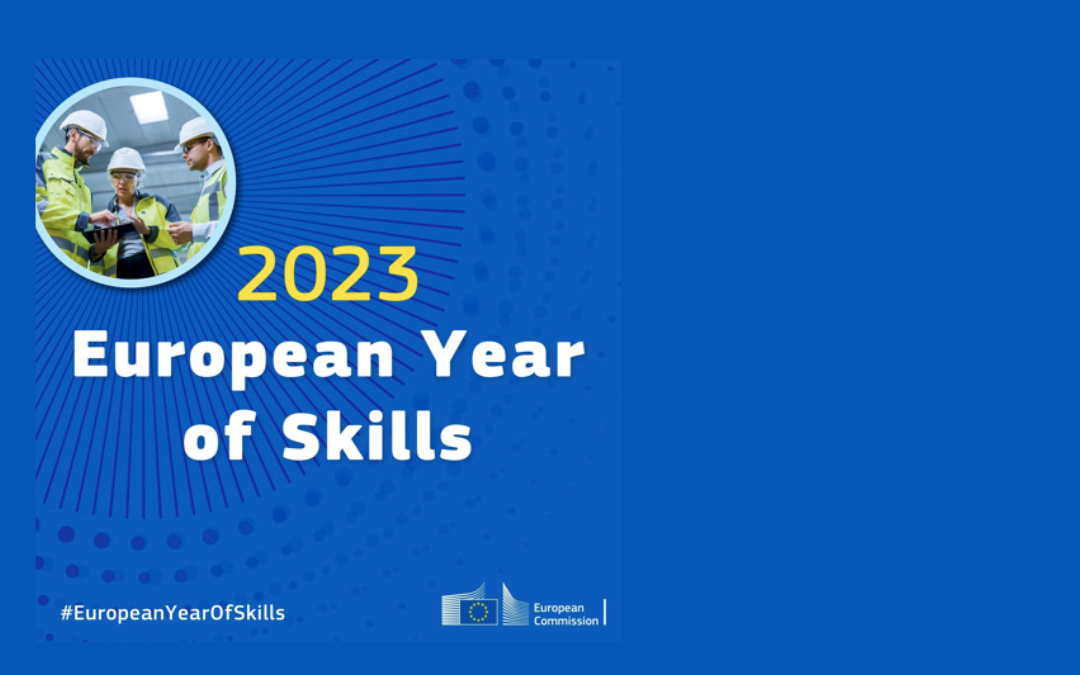You may have already come across the phrase European Year of Skills 2023.
It became relevant last September when the President of the EC, Ursula von der Leyen, called for increased, more effective and inclusive investments in training and upskilling in her 2022 State of the Union address. The Commission followed her announcement by adopting a proposal to declare 2023 as the EYS on 12 October. This is expected to give a new impetus to lifelong learning, aiming to develop and utilise the potential of the European workforce fully.
The European Commission will also promote matching skills with the needs of the labour market and people’s aspirations and skill sets with opportunities in the job market, especially for the green and digital transition and the economic recovery. There will be a particular focus on the inclusion of women and young people, especially those not employed, in education or training. Among the goals is also the attraction of people from third countries with the skills needed by the EU, including by strengthening learning opportunities and mobility and facilitating the recognition of qualifications.
Source: EC website in Slovenia
To achieve the above goals, the European Commission has planned to collaborate with the European Parliament, Member States, social partners, public and private employment services, business chambers, education providers, individuals and companies. However, it is worth noting that the initiative, at least in the Proposal for a Decision, is intended only for the active population (working, unemployed and inactive adults).
The Commission will promote skills development in conjunction with existing EU initiatives, such as the European Skills Agenda, the Pact for Skills, Structured Dialogue on digital education and skills, the New European Innovation Agenda, European Digital Skills and Jobs Platform, the EU Digital Skills and Jobs Coalition and others.
Investments in skills will be supported by existing EU financial resources and forms of EU technical support. These include resources from the European Social Fund Plus (ESF+), the Recovery and Resilience Facility, the Digital Europe Programme, the Horizon Europe Programme and Erasmus+. With a budget of €26.2 billion, the latter, among other things, supports the personal and professional development of learners, staff and institutions in vocational education by funding mobility activities and partnerships for cooperation across Europe.
There are also many other Facilities available, while there is no specific resource for marking the EYS.
The initiative for the EYS should be based on a holistic understanding of skills!
The EAEA, a civil society advocate and 120 members – ALE providers across Europe, has responded positively to the initiative for the EYS. At the same time, they emphasise the need to consider that life and work are closely intertwined. Skills are, therefore, necessary for both purposes, and there is often no clear distinction between them. Developing, continually upgrading and using them are all relevant to the well-being of individuals, communities and society.
The above Proposal for a Decision on the EYS is, according to the EAEA, too narrow and mainly focused on the labour market. They believe that, in addition to skills for work, attention should also be given to those for personal development, democratic citizenship, inclusion, sustainability, digital transformation, and the list goes on. In their statement, they advocate for the recognition of transversal and transformative skills. They also emphasise that non-formal learning and education for adults plays a crucial role in all of this. We could not agree more!
From October until now, the Proposal for a Decision on the EYS has undergone many discussions in civil society platforms and various bodies of the European Commission. It is now slowly entering the final stage of negotiations. The publication of the final version of the Decision is scheduled for 9 May, just before the start of this year’s LLW. This means that the European Year of Skills will exceed the calendar year 2023 and continue until 8 May 2024.
How will we implement the EYS?
In the Proposal for a Decision on the EYS, the Commission has proposed organising events (conferences, forums, etc.) and public awareness-raising campaigns on the importance of skills and ways to acquire them. Working groups should be formed to encourage discussion and exchange of good practices. The dialogue between the stakeholders listed above should be strengthened. Proposed are: the promotion of education and upskilling programmes, financial incentives and other support facilities. These also include the development of skills intelligence tools and the promotion of tools and instruments for increased transparency and easier recognition of qualifications, including qualifications awarded outside the EU. Implementation of the Decision on the EYS will be binding for EU Member States, but the methods of implementation will be within the jurisdiction of each individual country. For more information, please visit the website.
Are you interested in how Slovenia will respond to the initiative for the EYS?
What (already existing) things will we highlight, and what will we carry out for the EYS? What alliances will we form, and what will be their potential in the future?
At the moment, many public institutions and other organisations are devising ideas for collaboration. We will gather and coordinate these ideas in close cooperation with the MLFSA. In addition, we will combine our efforts with various stakeholders – from the national to the local level, all the way down to the individual (and vice versa).
The Decision on the EYS also requires each country to appoint its national coordinator. At the suggestion of the MLFSA, I, the author of this article, was nominated for this role.
I see my contribution in the comprehensive information and awareness-raising about the EYS and everything this initiative represents and promotes. So stay with us – you will receive relevant information, and perhaps we will also connect in celebration at various venues throughout Slovenia.
Zvonka Pangerc Pahernik, MSc (zvonka.pangerc@acs.si), SIAE

